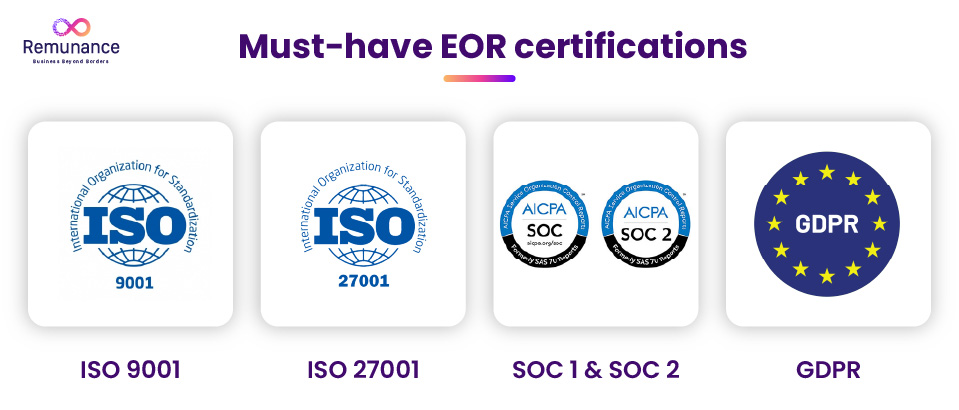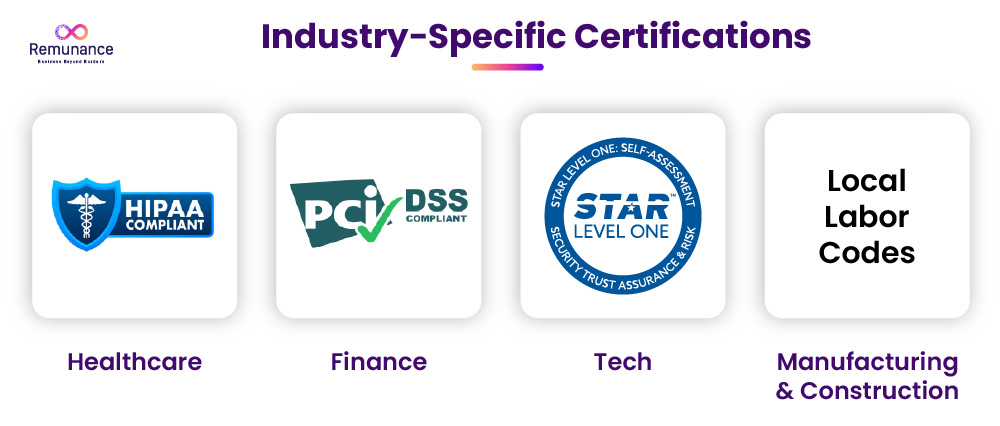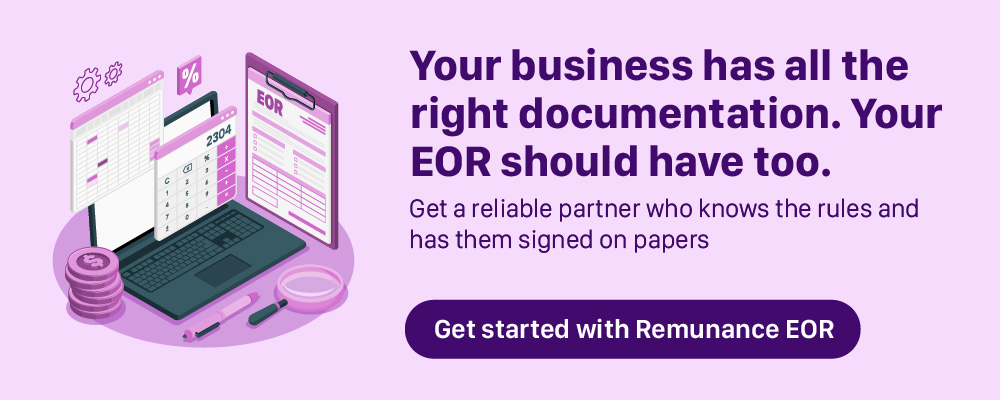Which Certifications Are Essential for Your EOR?
Which Certifications Are Essential for Your EOR?
Blog Article
EOR certifications didn’t used to matter much. A decade ago, businesses expanding overseas often relied on handshake deals. At most, on basic legal coverage to onboard remote talent. But today, that approach is ancient history.
There are stricter global regulations now. For example, rising data privacy concerns and heightened scrutiny over cross-border employment practices. Hence, certifications have evolved from optional extras to operational must-haves.
What’s behind this shift? Simple: trust. Companies need proof that their EOR can deliver consistent, compliant, and secure workforce management in any country.
In this blog, we’ll explore:
- The core certifications every EOR should carry (ISO, SOC, GDPR)
- The industry-specific credentials for healthcare, finance, tech, and more
- How certifications impact compliance, risk, and data security
- The real risks of going uncertified in global employment
So, let’s get started.
Which Certifications Should an EOR Legally Compliant Have?

If you do work with an Employer of Record, then you want to make sure they are fully legitimate. The best way to know? Check their certifications.
These aren’t just fancy badges. They prove the EOR follows key laws and standards around the world. The major ones to look for include:
ISO 9001: Quality
Widely recognized all across the globe as the gold standard for a quality management system.
Having that qualification is an assurance that the so-called EOR doesn’t operate in an ad hoc manner. All its processes, from onboarding to payroll, are consistent, reliable, and timely in application.
It ensures the EORs:
- Listen to client feedback
- Solve problems fast
- Improve operations continuously
In short, ISO 9001 proves the EOR runs like a well-oiled machine. That matters when you’re trusting them with your team.
Here’s what our clients speak about us!
ISO 27001: Security
Your team’s data is precious. There should be no compromises with that.
ISO 27001 means information security. It is a handy indicator that the EOR is doing everything in its power to ensure that sensitive information is protected. It covers everything from employee records to payroll systems.
This certification requires:
- Risk assessments
- Data encryption
- Access controls
- Disaster recovery plans
An EOR with ISO 27001 is one that takes cybersecurity seriously, not just talking about it.
SOC 1 & SOC 2: Trust
These are audits, not just certificates. SOC 1 focuses on financial reporting controls. SOC 2 dives into data privacy, availability, and security.
If your EOR handles anything financial (spoiler: they do), you need SOC 1. For everything else IT-related, SOC 2 is your go-to.
These reports are:
- Issued by independent auditors
- Based on strict frameworks
- Regularly updated
With SOC 1 & SOC 2, you’re getting transparency and trust.
GDPR: Privacy
Got European employees? Then there should be no GDPR compromise.
The General Data Protection Regulation (GDPR) is a strict privacy law adopted by the EU.
It protects the data rights of an individual. It imposes rules on how companies collect, store, and process personal info.
An EOR that’s GDPR-compliant shows it:
- Respects user consent
- Manages cross-border data transfers
- Maintains full transparency
And yes, non-compliance can mean massive fines. So, make sure your EOR is certified here. Especially if you’re scaling into Europe.

What Industry-Specific Certifications Should I Look for in an EOR?
 Different industries have different compliance norms. That’s where certifications step in. They’re not just shiny badges for the EOR’s wall. They’re your first line of defense against costly regulatory slip-ups.
Different industries have different compliance norms. That’s where certifications step in. They’re not just shiny badges for the EOR’s wall. They’re your first line of defense against costly regulatory slip-ups.If your EOR claims to “know your industry,” the proof should be in their paperwork.
Here’s what you should see on file before you shake hands:
Healthcare: HIPAA or Bust
When it comes to patient data, HIPAA (Health Insurance Portability and Accountability Act) is gospel. If your EOR deals with anything from medical leave to health benefits, HIPAA compliance is non-negotiable.
Why does it matter? Because mishandling health data can lead to bankruptcy. Lawsuits, fines, brand damage, the whole trifecta.
Here are the green flags of this certification:
- Encrypted platforms to manage sensitive data
- Staff trained in HIPAA protocols
- Audit trails or documentation are ready when you ask
Finance: PCI DSS
This certification is your firewall. Suppose your EOR processes payroll or any kind of financial transaction. Then, PCI DSS (Payment Card Industry Data Security Standard) should be on your checklist.
Why it matters? Because, one security breach and it’s not just your EOR on the hook. It’s your business, too.
What to look for:
- Strong encryption and access control
- Regular system audits and penetration testing
- Secure, compliant tools for payment handling
Tech
Here, it’s either CSA STAR or nothing. Tech companies live in the cloud, and that’s where the risks are. The CSA STAR stands for Cloud Security Alliance Security, Trust, Assurance, and Risk.
This certification shows your EOR knows how to secure employee data stored in the cloud.
Why it matters? Because employee contracts, payroll data, and sensitive IP are all gold to cybercriminals.
CSA STAR credibility checklist:
- Transparent cloud security protocols
- Third-party security audits
- Clear response plans for breaches or outages
If you’re in tech and your EOR is vague about the cloud? Run.
Manufacturing & Construction
In these industries, local know-how is required. Because they come with boots-on-the-ground complexities. Labor laws, site safety, local regulations, and union rules are a few among them. Your EOR must know their way around them before the first hire is made.
One misstep in worker classification or employment contract can halt operations and rack up legal fees fast.
Ask your EOR:
- “Are you familiar with regional labor codes?”
- “How do you handle OSHA or equivalent safety standards?”
- “Got case studies from similar projects?”
An EOR without relevant certifications is like a pilot without a license. Technically possible, but definitely not recommended. Make sure your EOR comes prepared for the unique challenges your industry brings to the table.

Why Certifications Are Important for All EORs?
EOR certifications are much more than just “nice to have”. They show that an Employer of Record (EOR) meets strict industry standards. Also, the EOR services know how to handle global employment the right way. Let’s inspect the reasons why EOR certifications matter so much.
Legal Compliance
Certified EORs follow local and international labor laws. This is how the certifications help an EOR:
- Regular audits keep them up to date with changing regulations
- Helps prevent employee dissatisfaction and legal disputes
- Ensures payroll, taxes, and benefits are done by the book
Know more about compliance and payroll management in India.
Risk Management
To get certified, EORs must have strong internal controls. This is how certified EORs operate:
- They keep processes in place to catch errors early
- Reduces exposure to fraud and financial penalties
- Maintains consistency across countries and teams
Data Security
Handling employee data is a big deal. Certified EORs meet top global standards. They follow:
- Strict data access policies limit who can see sensitive information
- Regular security testing that helps spot and fix vulnerabilities
- Clear protocols in place for handling data breaches
- Employee data is stored in secure, compliant data centers
Accountability
Certified EOR providers are more likely to offer clear reporting and documentation. They have:
- Clean audit trails for every transaction
- Transparent SLAs and real-time performance tracking
- Easy ROI measurement process to stay in control
So, EOR certifications are third-party validations you can trust.
What Risks Do EORs and Their Clients Face Without Proper Certifications?
You must be convinced by now that a certified EOR is an inevitable option. It can create serious cracks in your international business expansion. Here’s what’s really at stake with an uncertified EOR:
Strategic Instability
- An uncertified EOR may not have the systems or scalability to grow with your business.
- You could face patchy support and inconsistent processes. There can even be sudden changes in service as you expand.
- Long-term collaboration becomes risky with an uncertified EOR. It can often result in operational slowdowns.
Employee Well-being Risks
- No certification means no guarantee that your EOR follows fair employment practices.
- Consequently, your team might miss out on important benefits or proper compensation.
- That leads to unhappy employees and higher attrition. This gives rise to hiring headaches and impacts the hiring budget.
Operational Vulnerabilities
- Uncertified EORs often lack robust systems for managing payroll, taxes, or compliance.
- The result? Pay delays, data errors, and clumsy HR processes. This ultimately frustrates your international remote teams.
- These day-to-day snags can seriously impact your remote team’s momentum.
Reputational Damage
- An unstable remote team can seriously damage your brand reputation in the international market.
- If workplace controversy hits, your brand takes the hit too.
- Once trust is broken, rebuilding credibility takes time, effort, and money.
Hence, we can clearly state that a certified EOR is directly proportional to your international expansion success.
Conclusion
To sum up, EOR certifications are performance indicators. They tell you which EORs can scale with your business and protect your people. They also keep regulators off your back. An uncertified EOR might seem like a shortcut today.
However, it could cost you far more in legal issues, data leaks, or failed expansions tomorrow. Curious which certifications matter most for your industry or next market? Stick around.
Our website has detailed checklists and expert guidance for region-specific EORs. We’ll help you choose an EOR that’s built to your suitability. If you’re going big with your international remote team, make it worth it! Report this page